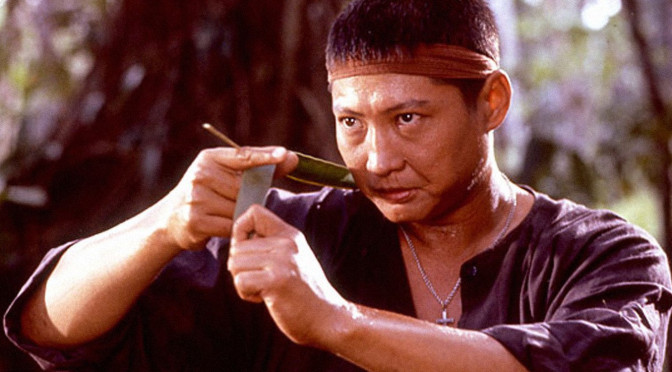
The living legend of martial arts cinema, Sammo Hung (Hung Kam Bo), should need no introduction. Although never placed on a pedestal of the same height or as revered in popular culture as the likes of Bruce Lee or Jackie Chan, his influence and legacy tower at equal heights.
Born in Hong Kong to a theatrical family in 1952, from the age of 7 he studied at the gruelling Peking Opera School, alongside many of whom would become the main players in front of, and behind the camera in the heyday of the Hong Kong film industry; one of which was Jackie Chan, who to this day refers to Sammo as “Dai Goh” (Big Brother).
Both Sammo and Jackie formed a highly competitive but deep brotherly bond from these formative years, that would last throughout their personal and professional lives, debuting on the Jade Screen as children, appearing together in ‘Big and Little Wong Tin Bar’ in 1962.
After scoring several gigs as assistant action director in such films as King Hu’s ‘Come Drink With Me’ and ‘The Fate of Lee Khan’, Hung became one of the main players at the Golden Harvest film studios in the 1970s. It is here where Sammo began to truly come into his own, playing occasional villains but mainly acting as chief action director.
Sammo was Instrumental in developing and pioneering (arguably alongside Liu Chia Liang and Yuen Woo Ping) a style of action choreography whose influence can still be seen on screens to this day with the likes of Ip Man and John Wick.
After his directorial debut with ‘Iron Fisted Monk’ in 1977, he went on to direct and produce an impressive array of ‘Old School’ Kung Fu movies, most, if not all, are now considered classics of the genre (4 of the films from this era top the proceeding list).
Branching out from Kung Fu into modern day action in the 1980s, teaming up with his little brother Jackie Chan in ‘Winners & Sinners’, and in particular, ‘Project A’, which was an all-out smash in Hong Kong, ushering in a whole new era of 80s action films (those well versed in Sammo’s directorial style and ‘look’ can probably tell the few scenes he himself directed).
This was the first of several much loved movies starring the ‘3 brothers’ Jackie Chan, Sammo Hung and Yuen Biao, all of whom would go on to have careers in their own right, still kicking (and punching and flipping) to this day.
Most westerners first caught eye of Sammo as the guy who fought Bruce Lee in the opening scene of ‘Enter The Dragon’ (sadly, the last fight scene Lee would ever shoot). Around 25 years later, Sammo himself would break into the American market with the Martial Law TV series.
In the 21st century, Sammo continued to make great films and choreograph some astounding action, but nothing can touch his ‘golden years’ in Hong Kong; pre–CGI, and no Hollywood sheen to tarnish the madcap batshit ballistic danger of the Hong Kong action film, the likes of which we’ll probably never see again, and for a somewhat ‘portly’ man, his level of speed and intricacy of acrobatics skill are nothing short of supernatural!
Here are 10 of the very best from the ‘Boss man’ Sammo Hung.
10. Heart Of The Dragon (1985)
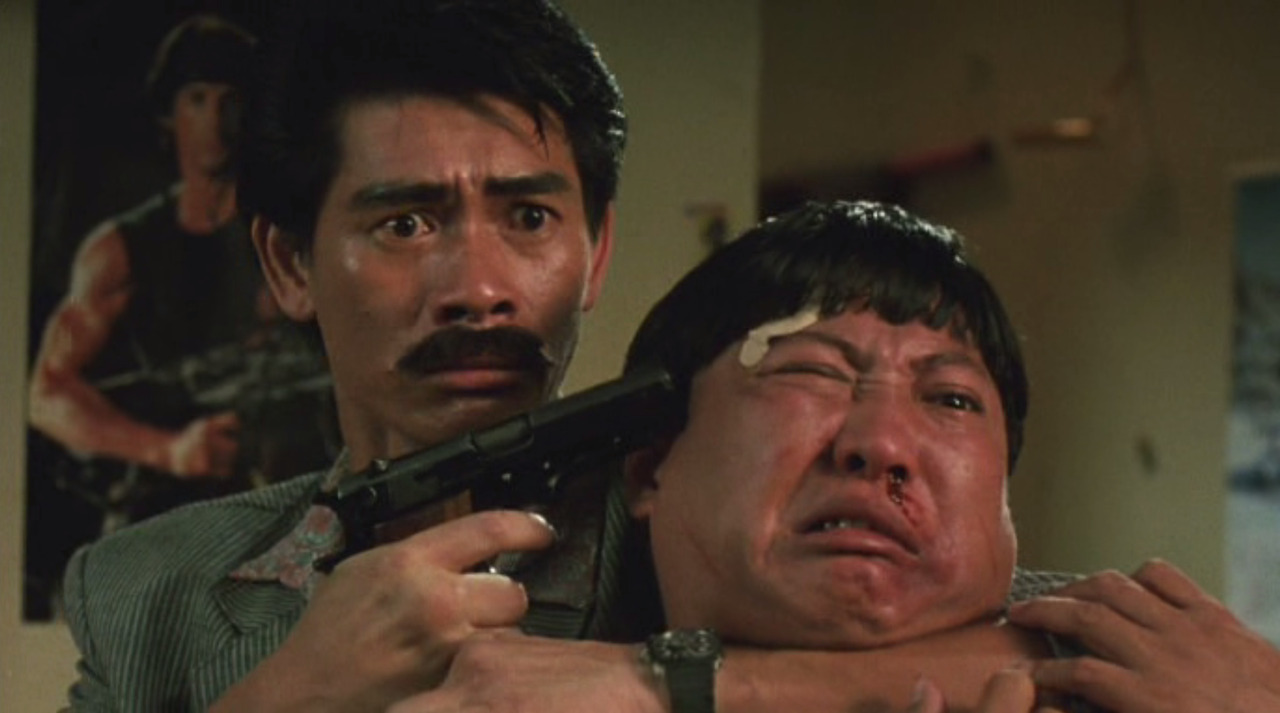
With Hollywood being the dominant blockbuster movie force on the planet, it’s always interesting to see other countries taking a premise from a recent Hollywood smash, and producing their own version. In this case Sammo took the basic premise of Rain Man and applied it to a Hong Kong action film.
With Jackie playing the Tom Cruise role and Sammo as the Dustin Hoffman character. The similarities end there though, however this particular film is far more tilted towards the ‘drama’ than his other more comedic action films with Jackie. So much so that certain versions were sold to overseas markets with several fight scenes removed that didn’t serve the narrative, and unusually there’s not a single slapstick gag in sight.
In the same vein, Jackie plays it straight here, portraying a young policeman who forsakes his dreams of travelling the world to look after his mentally challenged brother. The relationship is both tender and frustrated, with Jackie playing the role of carer, brother, and surrogate father, rescuing him from various scrapes and scenarios along the way.
Poor Sammo ends up getting kidnapped by a local gang, who then blackmail Jackie to release one of their criminal friends from jail. Hence bringing in the element in which to stage another grandiose end fight scene!
Sammo’s performance as a simpleton is both impressive and touching, capturing a naïve childlike innocence that is apparent in many of his other characters throughout this period. The film’s heart lies in this portrayal, and the compassion and sacrifice (and frustration) of Jackie’s character towards his brother, it seems to speak of truth and realism you seldom if ever find in an 80’s Hong Kong action film.
The Japanese version is the best available cut of this film, featuring 2 astounding fight scenes that were removed from other versions by distributors wishing to market the film as more of a drama. Which was a pretty unwise move, as they both serve well in puncturing the heaviness of the drama with the pulse of a visceral action scene. I mean, what Sammo Hung/Jackie Chan fans would WANT fights removed their films?
This is one of the lesser known gems in the filmography, and is often a pleasant surprise to casual fans digging deeper into the archive of Jackie Chan, or Hong Kong cinema as a whole.
9. Millionaire’s Express (1986)
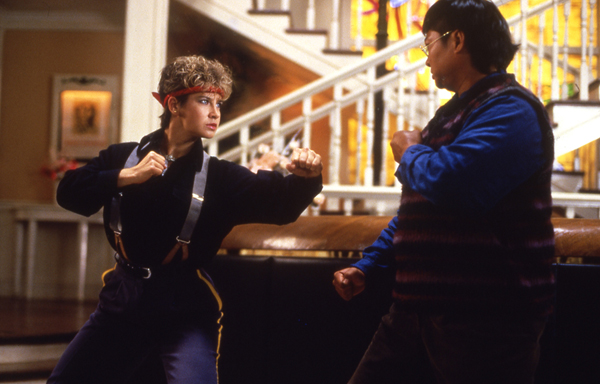
At this point in his career, Sammo seemed to be more than often shooting in exotic locations and mixing up genres in his projects, and it may be fair to call this his ‘Western’. Though it barely contains any gunfire, give or take the odd exception, in particular a scene in which an enormous Gatling gun is fired from the sidecar of a motorcycle, which jams from overheating, in which Sammo seeks to resolve by pissing over the barrel!
Sammo plays an outlaw by the name of Ching Fon Tin, on the run and being pursued by gung ho sheriff Fook Loi (played by Hong Kong matinee idol Kenny Bee) who is constantly on his trail. Ching Fon Tin’s plan is to travel back to his hometown to redeem himself to the townsfolk, who had previously cast him out for his criminality. Fon Tin has hatched a plan to bring prosperity and fortune to the townsfolk.
To achieve this he blows up the train tracks that run past the town to intercept and bring to a halt the famous Shanghai Express, thereby forcing the rich upper class passengers to spend their time and money in the town.
It turns out other interests had similar plans, accompanying the rich passengers onboard are a gang of bank robbers, a posse of Ninja’s, 3 Japanese Samurai, city mobsters, bank robbers, sex workers, and a whole plethora of curious characters, who all descend on the town.
Here various sub plots intermingle and a series of comedy sketches unfold (and the inevitable blubbering romance scene that would feature in most of Sammo’s movies from here on in), you’re starting to wonder ~ ‘Where the hell is the action at?’
It’s almost as if Sammo is making up for it in the finale and cramming everything bar the kitchen sink into the last half hour, with some of the finest fists and faces of Hong Kong cinema duking it out in one of the ultimate all time showdowns.
The truth is, without exception, every single film on this list features an end battle/fight sequence which rank as some of the greatest in cinematic history, Asia or otherwise. This one is no exception. Sammo pulls out all the stops with the entire town breaking out in the most epic brawl this side of Stalingrad.
If you’re relatively new to Hong Kong movies from this period, it may serve you well to leave this one on the back burner, and seek out as many of these movies from the 70’s and 80’s as you can. Only then will you truly appreciate the amount of familiar faces of the industry featured in a single film.
An interesting side note ~ This film features Cynthia Rothrock, in little more than a minor part/cameo role, but her involvement was the sole reason this film receives a wide release in the UK, due to her burgeoning stardom in the video rental shops in the UK back in the day with the likes of China O Brien and Rage Of honour!
8. Pedicab Driver (1989)
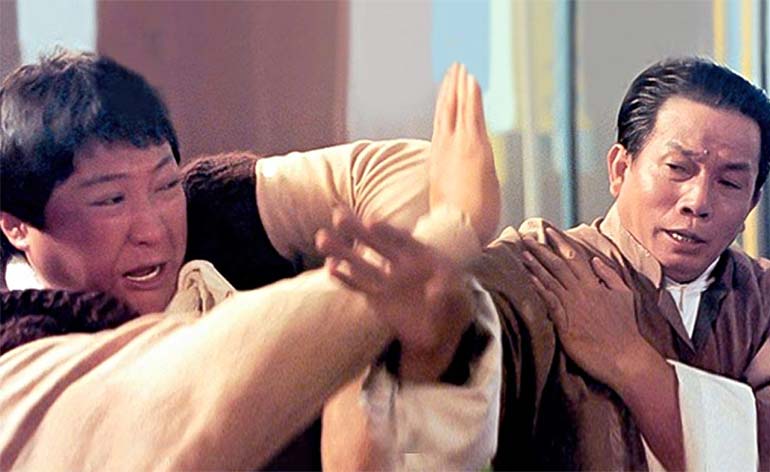
Sammo ends his most prolific and successful decade with a gut punching tragicomedy action drama. In true Sammo style, blending the harrowing with the hilarious, sometimes in the very same scene.
Sammo plays Lo Tung, a naive but assured everyman, a role by and large most suited to Sammo acting style. We are transported to 1920’s Macao, to the daily life of a particular gang of Pedicab Drivers, led by our man Sammo. It’s worth noting how the clothes and set designs, while not overtly elaborate, do a fantastic job of recreating the era.
Sammo and his handsome co~worker (nicknamed ‘Malted Candy’) both stumble upon respective love interests, Tung with local bread maker Nina Li Chi and Candy with a local girl who he meets when accidentally running her down in the streets!.
Typical of Sammo’s films from this era, we are treated (and somewhat tortured) by slow motion ‘romantic’ scenes of each character on dates, as awfully cheesy Cantonese pop (Cantopop) plays on the soundtrack. That aside, the action (as always) more than compensates for the overly elaborate gags and cartoonish romantic set pieces.
At midpoint we are given a wonderful treat in the form of a weapons duel between Sammo and fellow legendary Hong Kong choreographer and director Liu Chia Liang (of 36th Chamber of Shaolin fame). Liang plays the owner of a gambling den where Sammo has unfortunately crash landed through the window in his pedicab while being pursued by local gangsters and their lecherous boss, played by another Sammo regular John Shum in a role so suited to his looks and demeanour you would think he was a corrupt sleazy shameless and unscrupulous spoiled thug in real life!
As it turns out, the love interest of our Malted Candy is a prostitute by night, working to pay her debts to the aforementioned lecherous gang boss, who also doubles as the local pimp. She planning to leave the life and settle down with her new found love, but pimp daddy catches wind of this and despatches his men to slay her and her new lover.
Without wishing to spoil the plot I must refrain from disclosing the following sequence, but suffice to say things get dramatic, with Sammo storming pimp daddy HQ for a bit of the old ultra chop socky violence in another astounding end set piece, equally comedic and brutal. It brings this precariously paced but wonderful Sammo film to a bone crunching close, leaving the viewer reeling from another spectacular action set piece.
7. Wheels On Meals (1984)
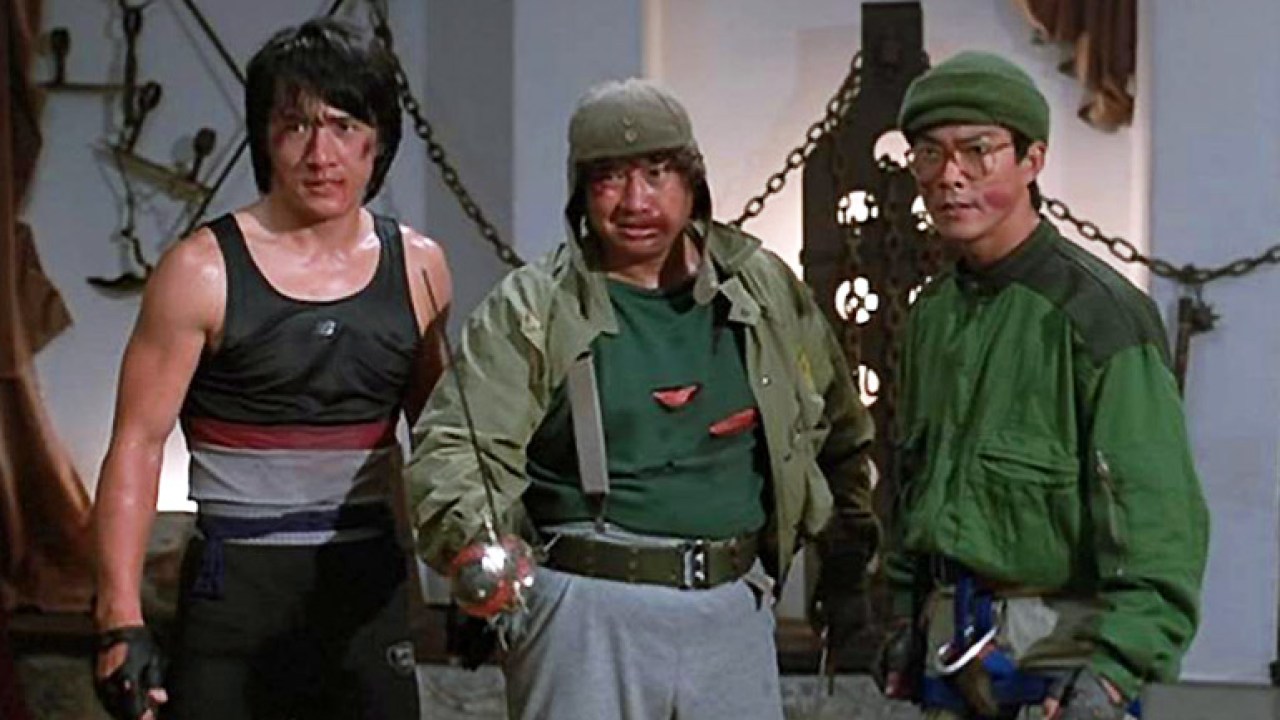
After an unsuccessful attempt at launching Jackie Chan in Hollywood with Battle Creek Brawl, Jackie returned to Hong Kong rather stung, and determined to bounce back in a big way.
Calling on his brother Sammo for support they collaborated on Jackie’s next film Project A (1983) which became the biggest smash of that year, immediately paving the way for their next collaboration that became Wheels On Meals, which arguably did more for Jackie and Sammo’s international careers than any previous or subsequent film, until they both broke into the US market with Rumble In The Bronx and Martial Law respectively.
Part of the reason for this is that Sammo went for a far more international flavour by moving the location from the usual drab claustrophobic streets of Hong Kong to sunny Barcelona in Spain, Sammo was granted leeway from the Spanish government to bring the entire Hong Kong crew overseas which was pretty much unprecedented at the time, and Sammo takes full advantage of the exquisite Spanish locations.
This was the second 3 brothers films in which all 3 characters are given pretty much equal billing and screen time, despite Jackie being a fully fledged star at this point. The 3 brothers were tight at this stage in their careers, and it would take several years for the real cracks to appear in their relationship, which culminated in their final collaboration together with Dragons Forever (1988)
Sammo plays a private detective named Moby (replete with a perm hairdo!). There are other noticeable examples of 80’s fashion on display throughout the film adding a rather rich palette of camp and colour to almost every shot.
Moby is hired to track down pick pocket Sylvia, the heir to a sizeable inheritance who is being tracked by a criminal gang in pursuit of the money. Jackie and Yuen Biao play Thomas and David, cousins who run a fast food mobile in the local plaza.
Sylvia the pickpocket is being pursued after pick pocketing a hillbilly tourust and stows herself away in our hero’s van to evade capture, with all parties inevitably get swept along into the whole fiasco. Culminating in the inevitable epic brawl in the final reel, the highlight of which is Chan’s fight with real life kickboxing champion Benny ‘The Jet’ Urquidez.
Apparently during the shoot, Benny and fellow martial artist Keith Vitali (playing one of the goons alongside Benny) would visit various martial arts schools in Barcelona to test their skills against the locals!
At the time of its release, Inside Kung Fu Magazine hailed the Jackie and Benny fight as the greatest ever committed to film, and many fellow critics and fans were in agreement.
This was the very early days of modern day based action films in Hong Kong, their 70’s counterparts were pretty much wall to wall ‘Old School’ kung fu, in that the fight sequences were shot more ‘conservatively’, allowing the camera to capture the intricate techniques of the fighters, and the rhythm of the ‘dance’ that was the operatic style in vogue in Kung Fu movies at the time.
Sammo, being one of the major pioneers of that very choreography levels up here into a faster more realistic kick boxing style, far from the classical forms of Kung Fu, & you can clearly witness REAL punches being exchanged. These boys sure as hell suffered for their art, in the most literal sense!
6. Dragons Forever (1988)
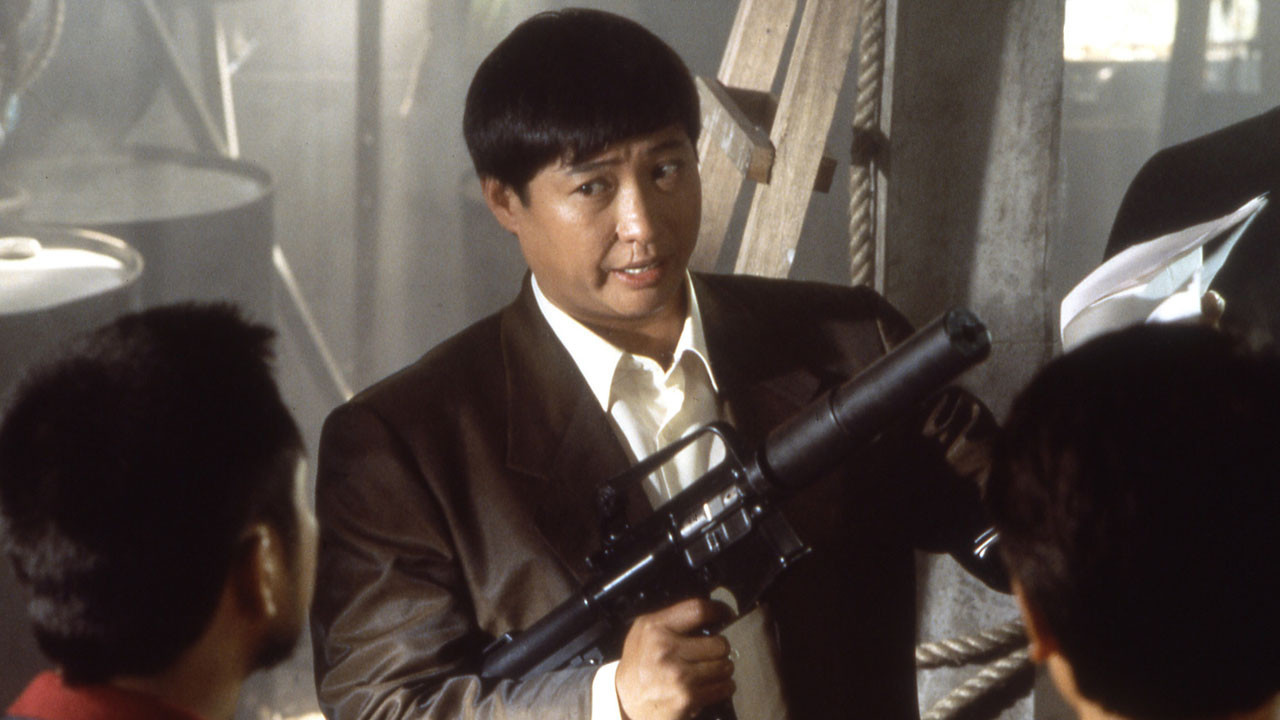
Dragons Forever may very well be the peak of 1980’s Hong Kong martial arts action cinema, at least in terms of pure action. The last of the 3 Stooges/Holy Trinity of films to star childhood opera school brothers Jackie Chan Sammo Hung and Yuen Biao, which sad as that may be they sure as hell went out with a bang, leaving us all guessing as to what ‘could have been’, but safe in the knowledge that if this was in fact their last hurrah together, their legacy as a team would never be tarnished.
Playing against his endearing everyman type, Jackie portrays a sleazy womanizing lawyer (called Jackie) who is hired to defend local mob boss Mr Hua, played by classic Hong Kong villain and fellow opera school member Yuen Wah, playing to his strengths as the quirky camp psychotic villain. There are very few actors post old school kung fu who were truly iconic villains in the industry, and Wah is up there among the very best.
Wah always brought a quirk to his role, conveying sheer menace in his face next to his seemingly unthreatening wiry thin frame, incorporating eccentricities and tics, often adding a prop for his character to brandish, in this case constantly puffing on a Stogie cigar, even during the action!
Mr Wah’s syndicate own a chemical factory that doubles as a drug den (obviously), that is dumping toxic waste into a local fishery, owned by the sassy Miss Yip (Deannie Ip) Who just so happens to become the love interest of Jackie’s criminal arms dealer friend Luke (played by Sammo Hung). Jackie is hired to defend the gangsters and becomes besotted by Miss Yips friend and a conflict of interest ensues.
To add spice to the unfolding drama we are introduced to a mentally disturbed cat burglar (played by 3rd brother Yuen Biao) who is hired by Jackie to bug the house of Sammo’s girlfriend, resulting in the greatest slapstick routine the 3 brothers ever pulled off. Ranking way up there alongside the very greatest Marx brothers sketches.
After the only minor dip in the film which features another inevitable romantic montage scene sound tracked to some truly godawful Cantopop, our trio team up to take on the criminal gang, infiltrating their chemical factory to amass evidence only to find it’s the epicentre of an international drug operation!
In true Sammo form, the action literally pull no punches, and as usual, Sammo steps back from the limelight in the final fight to let his co stars shine. Jackie’s rematch with Benny ‘The Jet’ Urquidez may not be as epic as their bout in Wheels On Meals, but it’s tighter and more concise. Benny’s appearance is far more menacing and bizarre in this film, sporting a beige jacket and tie, pony tail and eye liner, bringing out those piercing eyes.
The bass heavy turbo score rumbling over the fight sequences is particularly effective, in perfect sync with the action. Yuen Biao performs his usual jaw dropping acrobatics and elastic kicking skills, worthy of note is Biao’s exceptional acting performance in this, widely regarded as his pinnacle in all of Sammos movies. As great as he is playing sidekicks and the everyman hero, he seems to thrive in the role of a disturbed mental patient and it’s a shame he didn’t get to expand upon this aspect of this thespian skills in further movies.
The cinema going locals of Hong Kong didn’t like their favourite stars playing against type, and all 3 brothers played almost the opposite of what they were known and loved for, resulting in the film underperforming at the box office. Sammo’s films were never as commercially viable in comparison to Jackie’s, who often leaned toward more clean and family friendly fare than Sammo who would often include ultra violence and perversity next to slap stick comedy routines.
Martial arts chorography has arguably never been bettered in the subsequent 33 years since this landmark film, and if you haven’t seen this I thoroughly recommend you seek it out immediately after reading this list! Dragons Forever indeed.